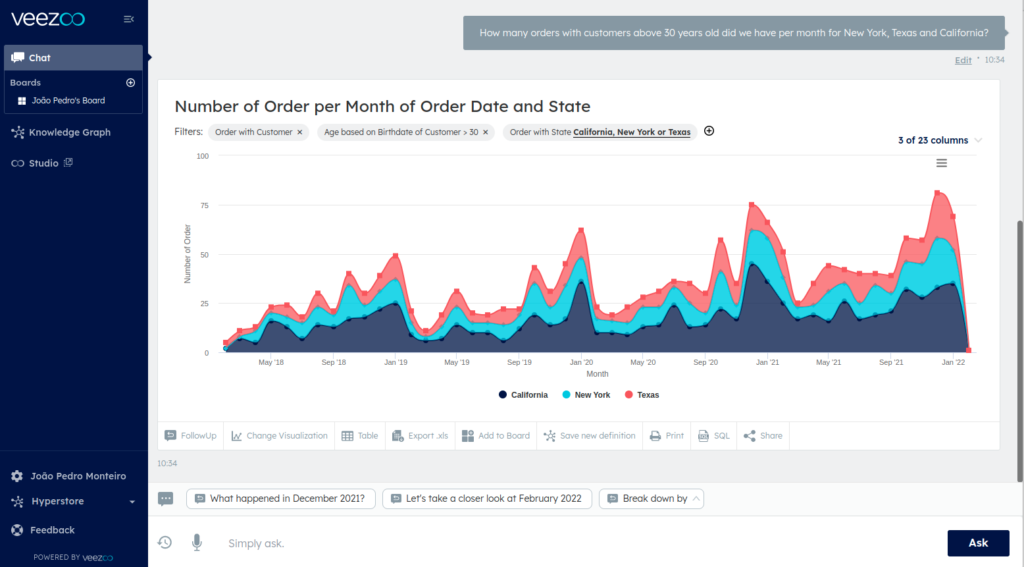AI Assistants: A Game-Changer for Business Users
One of the most impactful developments in the AI revolution is the advent of AI analytics assistants, particularly for business users. Let's look at why.

Not too long ago, the world of data analysis was a complex, coded language understood only by a niche group of data scientists and statisticians. Today, however, AI analytics assistants are transforming this landscape, making data analysis accessible and understandable to everyone, especially business users.
Business users keep a close eye on the business side of things. But unlike data scientists, they are not typically equipped with expertise in complex data analysis or coding. They need a tool that simplifies the process, making it easy to understand and act upon. That’s where AI analytics assistants come into play, a tool that makes data analysis accessible and intuitive for everyone. Apart from accessibility, AI analytics assistants increase efficiency by reducing dependencies on other teams (bye-bye bottlenecks).
The Evolution: AI Analytics Assistants Then and Now
Let’s rewind a few years back. Data analysis was considered a complex field reserved for technical experts. In fact, even today a large number of companies still see it that way. But a change is on the horizon – more and more companies are choosing self-service analytics tools and even AI analytics assistants in order to democratize data analysis.
Let me explain further. Imagine being a product manager at a large e-commerce company. You need to track product performance, customer preferences, and market trends. With the help of an AI analytics assistant, you can now ask questions like “What were the top-selling products last quarter?” or “What are the customer buying patterns for Product X?” and get immediate, accurate answers. You don’t need to wait for multiple business days for a report from your business intelligence team before moving forward – the answers are instant.
Some Examples of AI Analytics Assistants for Business Users
Several companies worldwide have recognized the potential of AI analytics assistants and are successfully implementing them to empower their non-technical workforce. Take Valora for instance, which uses Veezoo’s self-service analytics tool to glean insights from data, to assess the performance of their physical stores across Switzerland. Business users can ask questions like “Show me all Pretzel purchases that were made between 07:00 and 09:00 in Zurich on the last public holiday” and get instant answers, helping them make informed decisions swiftly.
Similarly, Baloise, a major insurance company, uses Veezoo to analyze customer data to develop need-based marketing campaigns which are very precisely targeted. For instance, they can ask questions like, “Show me all German-speaking customers of the General Agency Bern with our SME-Combo product with no legal protection coverage.” This gives them the intel they need to build highly targeted marketing campaigns, which have a much higher chance of conversion.

Facing the Challenges Head-on
The journey to AI analytics assistants has not been without its challenges. Primary among these have been understanding user intent, dealing with large datasets, and ensuring robust security. However, at Veezoo, we’ve met these challenges head-on. Let’s look at some common challenges associated with AI analytics assistants for business users and self-service analytics tools in general.
1. Understanding Complex Queries: Business users often encounter difficulties with AI analytics solutions when dealing with complex queries that involve multiple data sets or intricate conditions. Veezoo addresses this challenge by breaking the problem into two distinct parts: understanding the question and querying the data. It processes the question first, translating it into a mathematical representation to grasp it fully before diving into the data to find the answer. This approach allows Veezoo to actually understand and work with complex business logic.
2. Scalability and Performance: Handling massive datasets with billions of rows of data can be a challenge for AI analytics solutions. Traditional approaches may struggle to scale up and provide real-time analytics for such large amounts of data. Veezoo overcomes this hurdle by using a sophisticated architecture that balances understanding the question and querying the data, ensuring seamless scalability and performance.
3. Integration with Existing Systems: Business users often struggle with integrating AI analytics solutions with their existing infrastructure and systems. Veezoo simplifies this process by offering flexible and seamless integration capabilities, allowing users to quickly incorporate the solution into their existing workflows and benefit from AI-driven insights without the need for substantial investments in new hardware or software.
4. Security and Governance: Ensuring robust security and proper governance is crucial for business users dealing with sensitive data. Veezoo addresses this challenge by implementing strict security measures and data governance policies, protecting against unauthorized access and data breaches while maintaining data integrity and user trust.
The Future of AI Analytics Assistants for Business Users
In essence, AI analytics assistants for business users are about making data accessible and actionable for everyone in an organization. It’s not just about implementing advanced technology; it’s about empowering individuals to drive the business forward. As we advance into the future, the role of AI analytics assistants for business users will continue to increase in significance.
It’s important to remember though that they’re not aimed at replacing humans; instead, they’re supplementing our skills, enabling us to contribute more effectively to our organizations. The future will likely see even more sophisticated AI analytics assistants, with enhanced capabilities to understand complex queries, handle larger data sets, and provide even more accurate results.
We make it our business to be a reliable AI analytics solution for business users, enabling them to unlock the full potential of their data and make informed, data-driven decisions with confidence.


